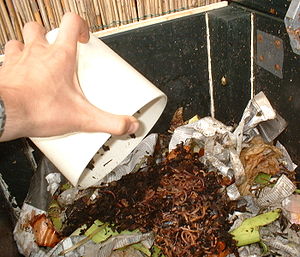| A worm composting bin. Worms are eating the newspaper bedding and producing compost. (Photo credit: Wikipedia) |
Fruits and vegetables are easily composted by the worms. The important thing to remember when serving fruits and vegetables is the size of the portions. Fruit pieces should be cut down to 1/2 inch pieces or slices. Smaller pieces will be consumed more quickly. Food blended up with water will also help the worms find the food and consume it faster.
Fruits and vegetables are highly nutritious. Worms that are fed an appropriate diet will in turn produce a nutrient rich substance that is beneficial to crops, gardens, flower beds and even indoor flower pots. Some nonfood items that can be offered to worms for composting are paper products, cotton rags, hair clippings, leaves and soaked cardboard. A pizza box that has been torn up and soaked is a wonderful treat for worms.
When offering leaves to a worm farm, be careful to only use products that have never been treated with chemicals. For the safety of the worms, grass clipping and other yard clippings should be avoided unless you know chemicals have not been used.
Dog and cat droppings can be used in a worm farm with care. Cats and dogs that have been dewormed recently will still have the substance within their bodies. The medicine used for deworming can be excreted in the droppings. If fed to the worms, the droppings can kill the worms quickly. If a pet has been dewormed recently, avoid using the droppings in the worm farm.
Care should also be taken when offering cat droppings from a litter box. Inorganic litters are unsafe for the worms. If your plan is to use the worms to compost the droppings, using a natural and organic litter will keep the worms happy and healthy.
While there are many foods that can be offered readily, there are also those that should be avoided. Care should always be taken with items that have been treated with chemicals, medications or other substances that may prove harmful.
| Composting-worms just added to a fresh batch of garbage in a self-made worm-bin. (Photo credit: Wikipedia) |
Citrus fruits, onions and garlic should not be used either. The worms appear to find the smell of these items offensive. Most worms will try to escape the bin to get away from the smell.
Feeding worms is a pretty easy job. The key is to know which items are good and which are bad for the health of the worms. Another point to always remember is to not over feed. New worms should be fed in small amounts when they are becoming established within the farm. Once settled, the amount can be increased over time.
Over feeding leads to problems such as foul smells and pests. Keep feeding down to a minimum, offering new food only when the old food supply is running low. Worms can eat over half their body weight in food per day. The worm population can double every few months. Overfeeding can cause a problem but keep an eye on the population as well to be sure that underfeeding isn't an issue.
A well fed worm population is a happy worm population. Happy worms produce a lot of naturally composted, healthy castings for soil enrichment therefore keeping the worm farmer and gardener happy as well.
Be sure to check back next week for a few common problems with worm farming, and how to avoid them.



No comments:
Post a Comment